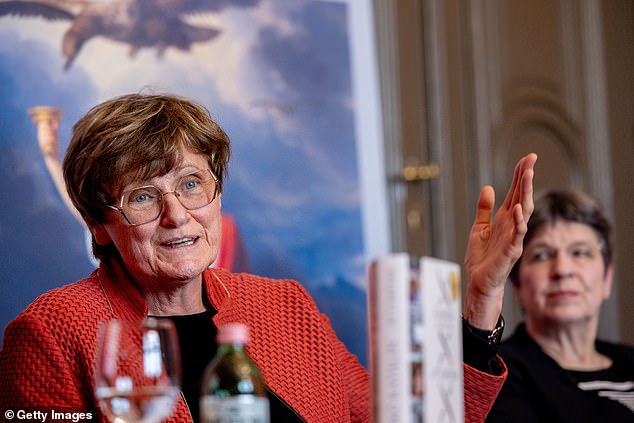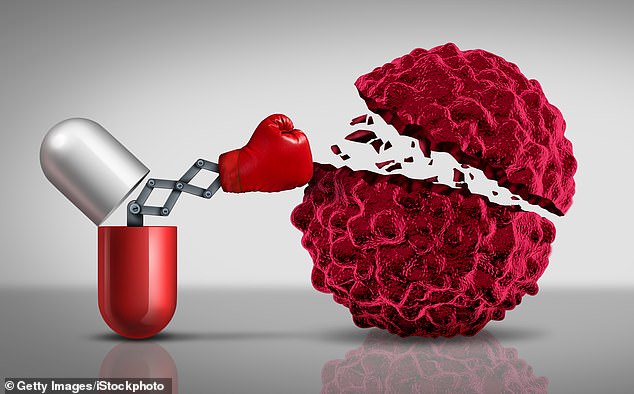For those of us navigating Sniper’s Alley in our late 60s, the recent news of an experimental cancer vaccine to stop bowel cancer from recurring is encouraging.
Not because this vaccine is going to save many lives – it is just a trial – but because it is a harbinger of good news to come, especially about cancer.
Cancer vaccines are the latest and greatest examples of a gold rush for new therapies that promise to turn most cancers into just another treatable and survivable affliction.
A few weeks ago, an experimental cancer vaccine was shown to have halved the mortality rate of melanoma patients.
For five decades, since Richard Nixon declared a “war on cancer” in 1971, progress against this most insidious of enemies has been disappointing.
While death rates from heart disease, infections, accidents and other causes plummeted, cancer death rates remained stubbornly high.
Since cancer increases with age, it is the leading cause of death in Britain.
Contrary to popular belief and the opinion of many doctors, cancers are not primarily the result of sin: they are the result of age. Smoking, sunburn and some aspects of diet aside, there is little that can be done to prevent the exponentially increasing likelihood of cancer striking as one ages.
Cumulative random mutations are “major contributors to cancer overall, often more important than external hereditary or environmental factors,” as one study put it.
As cancer increases with age, it has become the default cause of death for my generation and is the leading cause of death in Britain.
However, the situation has been slowly changing, which offers considerable grounds for optimism. More and more people with cancer are staying in remission for longer. The “age-standardized mortality rate” from cancer (a statistical tool that allows comparisons between populations with different age structures) has been steadily declining over the past 40 years, thanks to improved diagnosis, surgery and treatment.
The big three killer diseases (lung, colon and breast) have seen age-standardised deaths per 100,000 people in Britain almost halved since 1980.
In the case of lung cancer, the decline in smoking, accelerated by the adoption of vaping, has been a decisive factor, but prevention through lifestyle changes has proven much more difficult for other types of cancer.
Prostate cancer and pancreatic cancer, the next two causes of death, kill slightly more people per 100,000 than they did in 1980, even when standardized for age.
Time and again, the promise of miracle drugs for all types of cancer has proved disappointing. The reason is that cancers develop ways to disable the weapons sent to fight them.
Until recently, even when cancer was treatable, treatment was often brutal. In addition to surgery, months of radiotherapy and chemotherapy made patients’ lives almost as bad as the disease itself.
But that is changing now as generations of new, gentler treatments are coming online.
There are promising new drugs, including “antibody-drug conjugates” or ADCs, which combine an antibody that targets cancer cells with a chemical that kills them.
There is also growing enthusiasm for “checkpoint inhibitors” that disable the mechanism that stops the immune system from attacking its own body. Otherwise, the immune system is not allowed to kill the cancer because it thinks the tumor is part of you. Hence the recently announced melanoma trial, conducted by Merck and
Moderna, which combines a checkpoint inhibitor called pembrolizumab (brand name Keytruda) with a vaccine that triggers the immune system to attack specific antigens (a type of protein) on the tumor.
In the first results of the clinical trial with 157 patients, this combination increased the survival rate of those treated from 56 percent to 75 percent in almost three years.
It is these cancer vaccines that may prove most promising. Their story is a typical example of how difficult it is to get new ideas taken seriously.
Katalin Kariko, the Hungarian-American biochemist who in the 1990s set out to make cancer vaccines from a molecule called messenger RNA, had to overcome extreme skepticism within the scientific community.
As his experiments repeatedly failed, he faced pay cuts, demotion and denial of tenure. However, last year he won the Nobel Prize, along with his colleague Dr Drew Weissman.
It was Covid, not cancer, that ultimately catapulted mRNA vaccines to fame (and notoriety).
Two companies, Moderna in Boston, US, and BioNTech in Mainz, Germany, took Dr. Kariko’s ideas and turned them into an incredibly fast way to produce vaccines against the spike protein of the SARS-CoV-2 virus.
It has revolutionised the slow-moving world of vaccine development. In older people in particular, these COVID-19 vaccines saved many lives. But governments overhyped the vaccines, wrongly claiming they would prevent transmission of the virus, and tried to make vaccination passports a condition for working in various professions.
This has led to a disastrous backlash against all vaccines, and mRNA vaccines in particular. This is worrying because mRNA vaccines will actually gain ground against cancer, as Dr. Kariko and Dr. Weissman originally intended.
It would be a mistake to place too much hope on those suffering from cancer today. Many advances will take years to bear clinical fruit, while others will fade away in disappointment.

Nobel Prize-winning biochemist Katalin Kariko had to overcome skepticism in the scientific world after setting out to make cancer vaccines from the molecule messenger RNA.
But in an age of almost compulsory pessimism, it is all too easy to forget how much our lives are improving every day. The themes that dominate our news media – the wars in Ukraine and Gaza, China’s authoritarianism, Britain’s economic stagnation – cannot and do not stop the constant improvement of our lives through innovation.
In biomedicine, Britain has an extraordinary track record. It was there that natural selection, the structure of DNA, DNA sequencing, in vitro fertilisation, genetic fingerprinting and cloning were first discovered or invented.
With its global lead in genomics, Britain could play a leading role in the cancer vaccine revolution. The National Health Service and Genomics England have created a cancer vaccine launchpad to attract clinical trials of cancer vaccines to the UK. Trials have begun for vaccines against colorectal, lung, liver, kidney and pancreatic cancers. Former vaccine czar Dame Kate Bingham says cancer vaccines will be cheaper than continuing to treat patients with advanced cancer with drugs.
“Cancer vaccines can be used for therapeutic purposes after surgery or chemotherapy, but ultimately they could also be used for prophylactic purposes, as we do with childhood vaccines against infectious diseases,” he says.
“For example, we could do a blood biopsy to detect any circulating tumor DNA before any lesions can be imaged and then vaccinate immediately.”
Over time, perhaps all middle-aged people could be vaccinated against the five major types of cancer.
However, Dame Kate has warned that the NHS is failing to make the most of this opportunity. Speaking at the Grand National Cancer Vaccine Summit in May, she said there had been a 40% reduction in new clinical trials since 2017.
Yet, as a recent analysis by Macmillan Cancer Support shows, Britain lags behind most comparable nations when it comes to five-year survival rates for common cancers. This is largely because the way we ration healthcare here is through delays – the gap between seeing a GP and seeing a specialist or having a biopsy is longer on the NHS than in most healthcare systems. In cancer, every day counts.
But the “not invented here” mentality is not helping either. A number of proton beam imaging and treatment centres, developed by Professor Karol Sikora with private money, have been widely boycotted by the NHS.
The genomic knowledge we have at our disposal today is extraordinary, like turning on a library light. Defeating cancer is therefore eminently possible. As long as we apply that knowledge wisely, the possibilities are immense.

